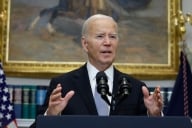You have /5 articles left.
Sign up for a free account or log in.
Corporate sponsorship is pretty common these days -- walk around campus, tour an art museum, listen to NPR, and you'll quickly encounter the name of some benefactor. But should Education Department meetings about the future of higher education have corporate sponsors?
That's the question some academics have been asking since invitations went out to the summit that will take place in June in Atlanta to discuss the Secretary of Education’s Commission on the Future of Higher Education. The invitations indicate that they are coming from Margaret Spellings, the secretary, but that the event is "hosted by the Coca-Cola Company at the Hilton Atlanta." A similar reference to Coke as the host of the meeting appears on the department's Web site. The Atlanta meeting is one of a series of regional conclaves the department is holding to follow up on a national summit it held in March.
One reason the apparent corporate sponsorship of the Atlanta meeting is drawing snickers is that the national meeting was held at the Willard Intercontinental -- a landmark Washington hotel known for its exclusivity and luxury, not the transparency and frugality of the sort the secretary advocates for higher education.
Several people who have been attending Education Department forums in various places around the country through several administrations said that they could not remember seeing a department event that appeared to have a corporate sponsor like the Atlanta meeting (or one with hors d'oeuvres as nice as those served at the Willard).
While the Atlanta meeting is the only one identified as having a corporate host in a sponsorship style, the Boston regional meeting will take place at the headquarters of the EMC2 Corporation, a company whose software and services are used to secure and store information; the Kansas City meeting will take place at the headquarters of H&R Block; and the Seattle meeting will take place at Microsoft. No setting has been identified yet for the Phoenix meeting.
Coke is of course both an economic and philanthropic giant in Atlanta, but it is also a controversial company to some in higher education. Questions about the company's labor practices have led a number of American colleges to boycott Coke and many other colleges are facing student pressure for boycotts, although the company says that its labor record is a good one and many colleges welcome ties to the beverage powerhouse. Microsoft -- another corporate host -- featured prominently in one of the drafting controversies surrounding the Spellings Commission report. The commission -- after members thought they had agreed on all substantive changes in the report -- watered down an endorsement of open source technologies, when a commission member who is a Microsoft executive objected.
Asked a series of questions about Coke's role in the Atlanta meeting (including specific questions about how much money was involved and what it was paying for), the department's press office responded by sending a copy of a portion of the U.S. Code that says: "The Secretary is authorized to accept, hold, administer, and utilize gifts, bequests and devises of property, both real and personal, and to accept donations of services, for the purpose of aiding or facilitating the work of the Department. Gifts, bequests, and devises of money and proceeds from sales of other property received as gifts, bequests, or devises shall be deposited in the Treasury and shall be available for disbursement upon the order of the Secretary."
Pressed for details, Chad Colby said that he believed Coke was paying for food for the Atlanta meeting and that the department was paying other expenses. Arrangements for the other regional meetings would each be different, he said.
Critics -- most of whom did not want to be quoted by name -- said that they viewed the invitations noting Coke's role as host as further evidence of a corporate tilt by the department. They noted that the invitations were not generally available to rank and file professors and that the Spellings Commission report had a strong business orientation, but has been criticized for ignoring the liberal arts.
"The emphasis in the department's consultations seems to be primarily on colleges and universities as training grounds for corporate America, rather than as a place for students to explore a variety of perspectives and learn to think critically for themselves," said John W. Curtis, director of research and public policy for the American Association of University Professors, via e-mail. "This was reflected in the inclusion of corporate representatives on the secretary's commission while faculty were largely excluded. The fact that these follow-up 'summit' meetings are by invitation only, and appear to have some level of corporate sponsorship, only strengthens this impression."
Charles Miller, chair of the Spellings Commission, said that the arrangements for the regional meetings were set up to make it relatively easy for people to attend and that many businesses can be helpful in this area.
Miller suggested that some academics "seem to have a problem with the word corporation" and suggested that professors should welcome more business involvement. He said that most business leaders are strong supporters of higher education. "They pay the taxes, they are on the boards, they use the graduates, they know about foreign competition," he said.
In this context, it makes sense to look for ways to involve business leaders, he said. "It's wrong-headed to think that the only people who can talk about the academy are the people who are in it."








